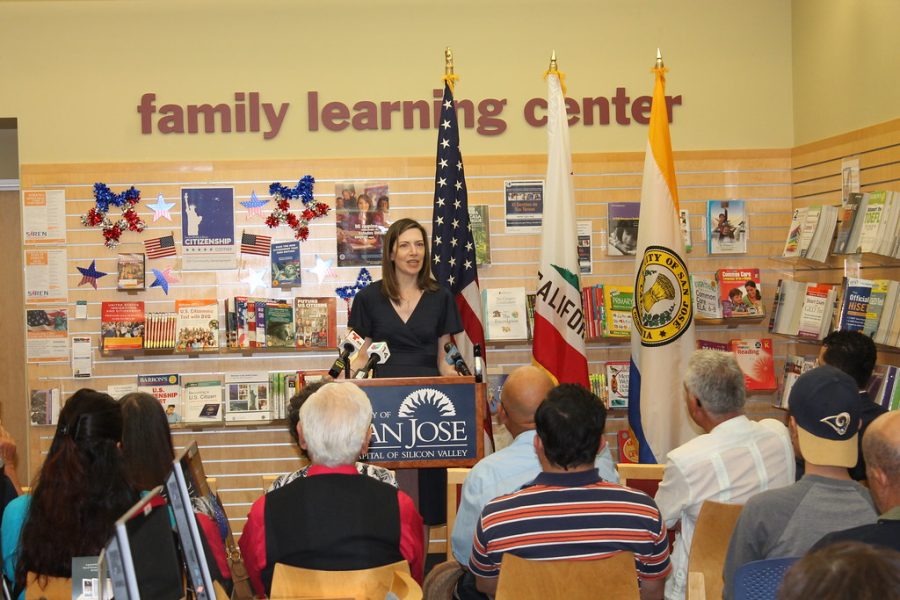Why the U.S. Citizenship test is unfair and not useful
A crowd of soon-to-be American citizens prepare to take the Oath of Allegiance in San Jose, California.
Mar 24, 2023
I was watching the famous television show, “Jane the Virgin,” and while the plot is set up to simulate a telenovela, the characters often experience real-life events, such as a child out of wedlock, the stigma surrounding sex, life as a woman (more specifically a woman of color) and being an undocumented immigrant.
In the show, Jane’s Abuela, Alba, does not have a green card and is living in constant fear of being deported. Alba’s family convinces her to get American citizenship and throughout the show we see Alba studying for the test, practicing her English and finally receiving her green card.
The citizenship process is not shown in many television shows or in popular culture and it shocked me to see how rigorous the process is as well as the questions that are asked of these immigrants.
Jane helps Alba study for the civics portion of the test and I would pause the show to see if I could answer the questions correctly, being a natural-born U.S. citizen majoring in political science. While I got most of the answers correct, I correlated this to my area of study in school and began to wonder how many natural-born American citizens could truly answer these questions.
With this pondering thought, I became interested in finding the answer and decided to look more into the topic.
I first looked up the basic information about the test and questions: “Section 312 of the Immigration and Nationality Act (INA) requires naturalization applicants to demonstrate an understanding of the English language, including an ability to read, write and speak words in ordinary usage in the English language and demonstrate a knowledge and understanding of U.S. history and government (civics). To meet the requirements of Section 312 of the INA, applicants must pass a naturalization test to become U.S. citizens. The naturalization test consists of 2 components: an English language and a civics component.”
I’m going to be focusing on the civics portion of the test since most natural-born United States citizens speak English as their first language.
Naturally, the next thing I googled was the questions on the civics portion of the test. “The citizenship test consists of 100 questions. The U.S. Citizenship and Immigration Services (USCIS) officers will ask the applicant 10 of the 100 questions and the applicant must answer 6 out of the 10 questions correctly in order to pass the civics test.” Now keep in mind that this is not multiple choice, it is an oral exam, meaning there are no options given to the individuals; they must remember the information from the top of their heads.
With my curiosity spiking, I started to go through the questions and quizzed myself. The sections included American Government, American History and Integrated Civics. Some of the questions were basic U.S. History but others were oddly difficult to answer even with my background knowledge.
I needed to know more about the passing rate of the civics portion of the test by natural-born American citizens and decided to make a Google Form to send out to John Carroll students to test their knowledge of the United States based on the questions from Boundless which created a study guide for the civics test from the 2008 Immigration test.
I randomly selected 10 questions from the list of 100 by using a random generator to pick numbers and created the quiz. To keep the same difficulty level of the real test, I made the Google Form questions all short answers. The results were not what I expected.
While a smaller sample size of 33 respondents, only one person got a score lower than five. The other 32 would have passed the citizenship test. These results have an implicit bias as all of the respondents are college-educated students who have had multiple years of higher education.
I related these results to a study conducted by the Institute for Citizens & Scholars (formerly the Woodrow Wilson National Fellowship Foundation) where they found that “only one in three Americans (36%) can actually pass a multiple choice test consisting of items taken from the U.S. Citizenship Test, which has a passing score of 60, according to a national survey released today by.” It is important to note that the citizens that were tested in this study had choices since it was multiple choice and still less than 40% of Americans passed the test.
While the John Carroll statistics surprised me, it still made me question why non-natural-born citizens are being tested on information that does not truly relate to being an American citizen. How does knowing who the U.S. President was during the Great Depression correlate to being an American citizen? How is knowing the year the Constitution was written important to become a U.S. citizen?
If anything, teach these individuals how to do their taxes or how to apply for credit cards or how to get employment opportunities, or how to create a resume, cover letter, letter of recommendation, etc.
Knowing the U.S. President in a past historical event doesn’t help these immigrants become successful citizens. The U.S. citizenship test is an unfair representation of what it takes to be an American citizen, as proven by the study conducted by the Institute for Citizens & Scholars.
It’s time for a change in this country and the change can start with helping people who want to be a part of it.














David S Dorr • Jul 15, 2024 at 6:20 pm
I agree!
My wife is coming to the U S
( we were married in 2022 in Cebu, Philippines) and she knows quite a bit about the U.S. as the Philippines is quite educated about the U.S. and world events but she would not know about FDR as 32 nd President and who really cares.
This test is bias and should reflect only what truly matters to someone entering the U.S.